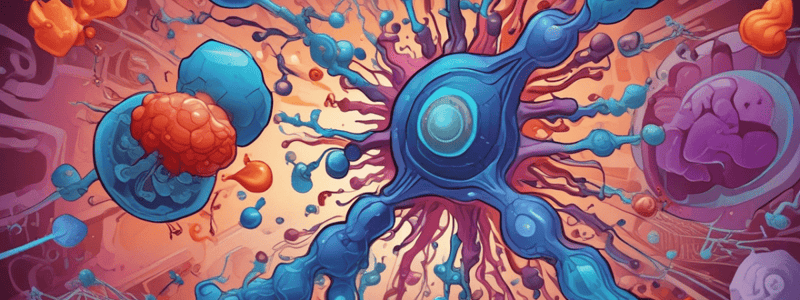Podcast
Questions and Answers
What is the ideal molecular size for an antigen to work well?
What is the ideal molecular size for an antigen to work well?
- Large (correct)
- Medium
- Small
- Variable
What is the significance of having varied amino acids in an antigen's composition?
What is the significance of having varied amino acids in an antigen's composition?
- It reduces the antigen's effectiveness
- It enhances the antigen's immunogenicity (correct)
- It has no impact on the antigen's functionality
- It increases the antigen's solubility
What challenge do antigens with multiple forms pose?
What challenge do antigens with multiple forms pose?
- They are more immunogenic
- They are more difficult to work with (correct)
- They are more recognizable by the immune system
- They are more soluble
What is the characteristic of haptens that makes them different from antigens?
What is the characteristic of haptens that makes them different from antigens?
Why are large insoluble antigens often preferred for causing an antibody response?
Why are large insoluble antigens often preferred for causing an antibody response?
Which of the following factors is not a determinant of an antigen's ability to initiate an immune response?
Which of the following factors is not a determinant of an antigen's ability to initiate an immune response?
What is the main advantage of binding a hapten to a carrier protein?
What is the main advantage of binding a hapten to a carrier protein?
Which of the following antigens would be most likely to cause an antibody response?
Which of the following antigens would be most likely to cause an antibody response?
What is the main challenge posed by antigens with multiple forms?
What is the main challenge posed by antigens with multiple forms?
Why is it important for an antigen to have a varied amino acid composition?
Why is it important for an antigen to have a varied amino acid composition?
Flashcards are hidden until you start studying
Study Notes
Antigen Characteristics
- Larger molecular size is generally more effective for antigenicity
- Antigens with varied amino acid composition are more effective
- Antigens with multiple forms (heterogeneity) can pose a challenge for immune response
Haptens and Carrier Proteins
- Haptens are small non-protein molecules that can be recognized by the immune system and bind to antibodies
- Haptens lack immunogenicity, unable to initiate an immune response on their own
- Haptens can be bound to a carrier protein to trick the immune system into producing antibodies
Solubility and Immune Response
- Large insoluble antigens are more effective at inducing antibody production
- Solubility of the antigen affects its ability to initiate an immune response
Antigen Characteristics
- Larger molecular size is generally more effective for antigenicity
- Antigens with varied amino acid composition are more effective
- Antigens with multiple forms (heterogeneity) can pose a challenge for immune response
Haptens and Carrier Proteins
- Haptens are small non-protein molecules that can be recognized by the immune system and bind to antibodies
- Haptens lack immunogenicity, unable to initiate an immune response on their own
- Haptens can be bound to a carrier protein to trick the immune system into producing antibodies
Solubility and Immune Response
- Large insoluble antigens are more effective at inducing antibody production
- Solubility of the antigen affects its ability to initiate an immune response
Studying That Suits You
Use AI to generate personalized quizzes and flashcards to suit your learning preferences.




